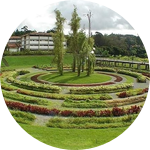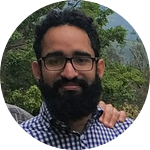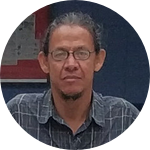About This Project
Artemisinin-based treatments (ACTs) are the main treatment used to handle the malaria disease produced by P. falciparum, but recently evidence shows that some strains of P. falciparum are less susceptible to ACT. We will reanalyze data of transcriptomic and metabolomic approaches available about strains of P. falciparum that have resistance to ACT. The goal is to build metabolic pathways that can explain how the parasite tolerates oxidative stress caused by artemisinin.
Ask the Scientists
Join The DiscussionWhat is the context of this research?
Plasmodium falciparum produces the most acute form of malaria disease wolrdwide, causing more than 400000 deaths anually. Serious concerns were arised recently by P. falciparum parasites that can tolerate artemisinin, the drug currently used to treat malaria caused by this parasite. This drug resistance have been extensively studied, but all the mechanisms that allow P. falciparum resistant strains to tolerate the drug effect are unknown .
What is the significance of this project?
Artemisinin-resistance parasites are a serious public health threat becuase this is the more used drug to treat P. falciparum, so drugs resistance have been extensively studied, nevertheless more efford are requiered to undertant this resistance. Metabolic changes in this parasites have been reported before. The importance of drawing these metabolic differences is the possibility to find new therapeutic targets or new ways to kill resistant-parasites.
What are the goals of the project?
The main goal is to find metabolic changes that allow artemisinin-resistant parasites to tolerate the drug's effect. Secondly, we want to associated specific proteins with these metabolic changes. For this proposal, we reanalyze several transcriptomic, metabolomic and proteomic approaches previously obtained from resistant parasites to build a model that agrees with this evidence. We already associated several metabolic changes to resistance focussing on an increase in oxidative stress response, also, we currently have found a protein that may be contributing to this stress response in P. falciparum, a process previously associated with artemisinin resistance.
Budget
Several advances in the project are currently made, in this sense, Open access publication money going to be used to publish our results soon in a scientific journal. The bioinformatics platform fee money going to be used to pay for cloud web services to make different analyses, to go deeper into our preliminary results. Equipment money going to be used to buy a hard disk to back up information and also for miscellaneous items.
Endorsed by
 Project Timeline
Project Timeline
This research began in 2020 as part of my thesis project, I began analyzing transcriptomic data. In lately 2020, I found different proteins that may have a role in the oxidative stress response of P. falciparum. I started modeling and making dockings on these proteins. I will finish the analysis in March-April 2021 and also write a paper of my results in April-May.
May 05, 2020
Project launch
Mar 30, 2021
Project Launched
Apr 15, 2021
Data analysis and modelling
May 31, 2021
Write the paper and submit it for publication to journal
Meet the Team
Affiliates
Affiliates
Alejandro David Bonive Boscan
I have been fascinated by nature and how life works and its changes, since my childhood. This led me to pose many questions that I wanted to answer; as I was able to explore and solve some of these puzzles, new questions came up. This cycle nurtured my scientific spirit and love for studying life, so I decided to study Biology, a decision that I am very happy to have made. During my years of study, many subjects interested me; however, Evolution, Bioinformatics, Biochemistry, and Ecology are among my favourite ones. I am in the final stage to finish my degree as a licentiate in Biology, a five-year degree that requires a thesis project.
I did my thesis at the National Center for Scientific Calculus of the University of the Andes – CeCalCULA, a research group focused on Computational Biology. I have been part of this research group for two years.
I decided to study the Plasmodium falciparum parasite, which produces the worldwide most dangerous form of malaria. This disease has usually been associated with Africa, but recently, it has increased in my country, Venezuela. Artemisinin is the principal drug used worldwide to treat malaria caused by P. falciparum, but recent evidence shows that some strains have some degree of resistance to this drug. Those resistant strains are not well understood.
Apart from bioinformatics and parasitology, I have also studied life from a macro viewpoint. In this context, I have worked in ecology, focus on birds of my city.
Ascanio Rojas A.
Director of Center for Scientific Calculus, University of Los Andes (CeCalCULA), Merida - Venezuela.
We do research in computational biology applied to the epidemiology, evolution and molecular population genetics of human parasites, focusing mainly on Trypanosoma cruzy and Plasmodium vivax, which cause Chagas disease and malaria, respectively. In addition, we train young researchers in these areas by teaching biannual courses in bioinformatics, evolution and biochemistry.
Interests: Computational Biology, Population Genetics, Molecular Phylogenetics and Evolution, Genomics and Bioinformatics courses
Hector Acosta Oviedo
Full-time professor in the Department of Biology of the Faculty of Sciences (Universidad de Los Andes, Venezuela) with a Master's degree in Fundamental Medical Sciences and a PhD in Cell Biology (Universidad de Los Andes, Venezuela). Researcher since 1997. I have developed my line in the area of Biochemistry, carrying out intermediate metabolism, enzyme purification and enzyme kinetic studies in Trypanosomatidae, specifically in Trypanosoma cruzi, Trypanosoma evansi, Trypanosoma rangeli and Leishmania mexicana (ULA) and Trypanosoma brucei (Victor Segalen University, France) as well as Phythoptora infestans, Plasmodium falciparum and members of the genus Pseudomonas.
Project Backers
- 10Backers
- 37%Funded
- $645Total Donations
- $64.50Average Donation



